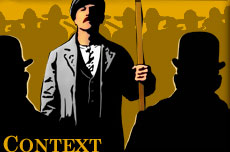The Project
Tumult and Tragedy: Michigan’s 1913-14 Copper Strike chronicles one of the greatest upheavals in Michigan’s history. The determination, conflict, sorrow, and tragedy of this epic confrontation changed the Copper Country for decades and memories of conflict remain to this day. This traveling exhibit explores the story of this remarkable period in Michigan history. This complex story involves many actors: copper mining corporations with Eastern executives, Michigan managers, and thousands of mine workers; national labor organizations with Copper Country union locals; governmental agents at the local, state, and national level; the state militia, local police agencies, and privately-hired deputies; and local commercial and civic groups. Most importantly, the 1913-1914 Copper Strike affected local residents from all walks of life.
No exhibit can succeed in exploring every perspective on history, particularly events as divisive as the 1913-14 Copper Strike. This exhibit intends to highlight the contexts within which this disruptive labor-management conflict developed and played out. Public knowledge and familiarity with the history of organized labor has declined during the last century, so some additional emphasis has been given to understanding mineworkers’ perspectives at the time of these events.
All images, unless those from Project Historian’s collection, or otherwise noted, are from the Michigan Tech Archives and Copper Country Historical Collections. |
Tumult & Tragedy is made possible in part by a grant from the Michigan Humanities Council, an affiliate of the National Endowment for the Humanities.
Any views, findings, conclusions, or recommendations expressed in this exhibition do not necessarily reflect those of the National Endowment for the Humanities or the Michigan Humanities Council.
Additional funding was supplied by:
Michigan Technological University
Cranking Graphics
Robert and Ruth Nara
|
Project Manager- Erik Nordberg
Project Historian- Gary Kaunonen
Project Designer- Mike Stockwell
Input and Comment
John P. Beck
Dee Erbisch
Larry Lankton
Jon G. LaSalle
Susan R. Martin
Michael Smith
Carla Strome
Sam Sweitz
Jo Urion |


